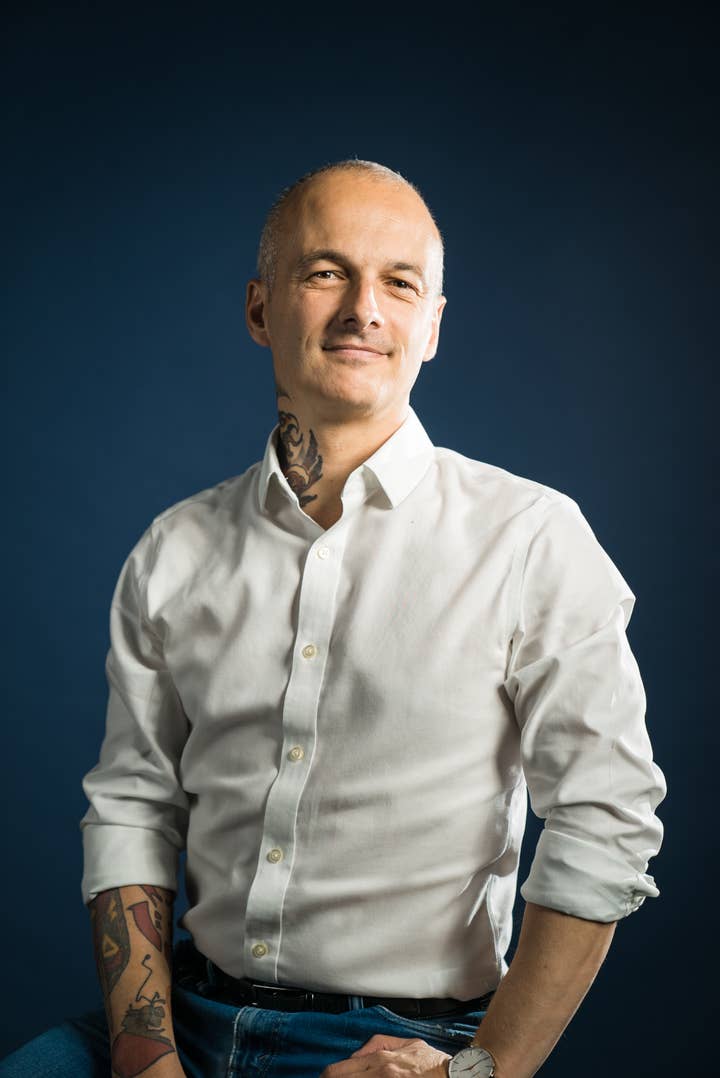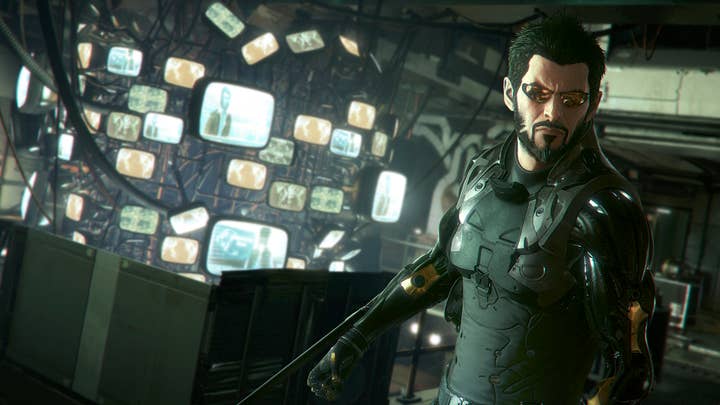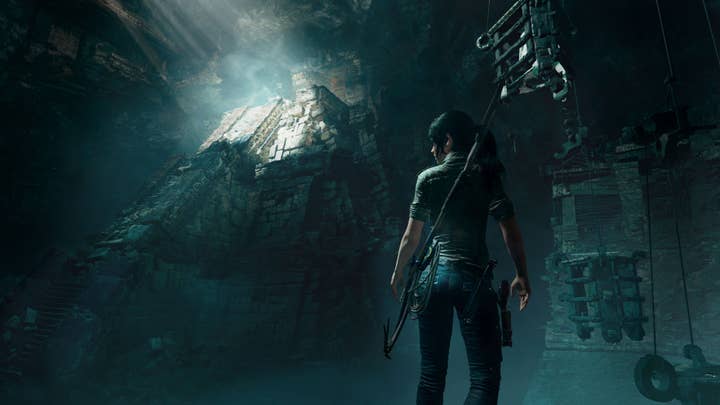Eidos Montreal: “We have to try new models for single-player games”
Shadow of the Tomb Raider dev on making $135 million narrative projects work
Eidos Montreal is the third developer I've spoken to in a week that's devoted to creating single-player narrative-driven video games.
It's purely coincidental. Yet what's interesting is that all three (the first was Play Magic, and the third interview goes live next week) are expanding significantly. Even as our chat with Eidos Montreal boss David Anfossi began, he was forced to apologise for the noise created by a mammoth refurbishment project going on around him.
"We're starting from scratch," he begins. "We have demolished everything, because we have to grow up in size. After ten years we wanted the studio to reflect the image of what we create. And to be more on par with the competition.
"We are adding 100 stations and developers, because at the moment we have three big productions going on at the same time."

This is interesting because the current industry belief is that single-player narrative experiences are dying away - at least in terms of AAA development. We're now in an age of Fortnite, Overwatch and PUBG. The recent smash hit success of God of War is an exception, not the rule. And besides, you simply can't monetise single-player games as effectively as a big, social, multiplayer experience. Right?
Eidos Montreal should know this better than most. It's last game, Deus Ex: Mankind Divided, was a commercial disappointment, despite impressing the critics.
"It's a question of maybe trends, or moment, or timing," Anfossi ponders. "Every year there is a new trend. At the moment it's Fortnite - which is a great game - and all the attention is around these kinds of games. But we just have to wait. I don't want to change a Deus Ex game or experience. We want to be respectful to that."
Nevertheless, Anfossi acknowledges that the audience for single-player gaming may be getting a little older, and its capacity to indulge in big, sprawling narrative adventures is on the wane.
"There are these trends every year, or every two years. Whether it is multiplayer, co-op, MMO or single player. If you deliver the right quality experience, you will reach the audience you want," Anfossi insists.
"That being said, I believe that the story-driven experience is going through a generational change. Especially for people like me, the old guys... people who are 25 or older. Looking at God of War, that's a pretty good example of a great single-player experience. I like it a lot, but I might not get the time to complete it. For me, that's a frustration. Because when you start a story-driven experience you want to see the conclusion. So we have to adapt and try new models.
"For example - and this is just my opinion, I'm not committing to anything - let's say that we develop a very good narrative, with a complex universe and strong characters. You start the game and then you complete it in three hours. That costs $30. That's it. Maybe that's the way to continue with story-driven games. You bring a strong experience, you make sure that the audience is interested by it, and that they can actually complete it.
"We always ask ourselves about that. But single-player for me is as strong as before, and it should continue."

Despite the love for single-player, Anfossi stated on the Eidos Montreal website that the firm is "going to be placing an added emphasis on the online experiences in our games." Does that mean the studio might be forced to abandon its previous path and deliver a Deus Ex MMO, or a Tomb Raider battle royale?
"We need to try new things, experience stuff and learn," Anfossi explains. "We want to build strong online technology. We are doing tests, we are learning, and we are working out how to apply that to our games, but we have to be careful about the fans. Online does not have to mean multiplayer. It could, but it could also be something different. It can be a single-player experience but online.
"We are trying different things. It's a bit pretentious, but I totally like the approach done by Nintendo where they have these small groups testing stuff. Even if it doesn't make sense right now, at some point you'll come across something cool to base a game on, or to put in a game. So we are doing that here. Online, for me, does not mean we forget the single-player experience. It could be part of that experience. Or it might mean we try multiplayer things at the same time."
"Online does not have to mean multiplayer. It could, but it could also be something different"
As Rob Fahey said in a recent column, using companies like Nintendo and Sony - who continue to have great success with single-player projects - as a template to follow is not always a sensible option. These companies are platform holders and have multiple revenue streams. God of War almost certainly made money for PlayStation, but even if it didn't it still would have brought customers into the ecosystem, who will then spend money on other PlayStation products. Retailers call this strategy loss-leading, where they take a hit in one area to drive improved sales overall.
Eidos Montreal is obligated to deliver revenue for Square Enix. Therefore, how much freedom does it truly have when it comes to experimental teams and testing new business models?
"Shadow of the Tomb Raider, and other different AAA single-player games, cost $75 million to $100 million," Anfossi admits. "And that's production only; it's close to $35 million on the promotion. So there's definitely a pressure. We cannot avoid it. But, at the same time, for us to have these incubation projects and to try small things... that gives us the opportunity to test, prepare and secure some stuff, and remove some risk.
"We also have a very strong process. It has been ten years now at the studio, so we have our way to test things with the gamers, to prepare and do market analysis studies and user research... We don't receive all the answers, of course. We have to take some risk on the creative side, but in the end we have a pretty good idea of the quality we have in our hands."
"Shadow of the Tomb Raider, and other different AAA single-player games, cost $75 - $100 million. And that's production only"
Inevitably, as has been the case with almost all of these interviews, the subject of Hellblade comes up. Ninja Theory's impressive, relatively short single-player game that generated decent revenue, looked amazing, won numerous awards and was made on a relatively small budget.
"It's amazing. I am playing it at the moment," Anfossi says. "It's exactly what we said a bit earlier about trying to change the business model. I believe it is six hours of gameplay. It's very cinematic, it's character-centric, it's a good experience that I like a lot. I believe they developed this game with around 20 developers. So I started to study it, because for me it's an interesting new approach, and the result is great. It's definitely a good way to stick with the older generations of fans of story-driven games."
We mentioned Eidos Montreal is looking to hire a great number of new staff, and this is because of the experimentation and tech development that the firm is undertaking. The studio has created an AI and machine learning department, it has been hiring data scientists and analysts, and it's re-developed its technology group to "be prepared for new platforms."
"I prefer to be proactive as opposed to reactive," Anfossi explains. "To give you an example on the AI field: at the moment, to create a good experience, you have to create 100 different archetypes. The work we're doing at the moment is to try and change that, to create just one AI and educate that to react to the player's style. It's a different way to approach development, and by doing so we will be more efficient, and I believe it will be less expensive to make games. But the experience will be much better."
Eidos Montreal's CV is full of more niche products - games like Deus Ex and Thief. As a result, despite its size (at more than 500 staff, it's the biggest Square Enix team), the developer isn't quite as famous as sister studios like Crystal Dynamics. That may be about the change with Shadow of the Tomb Raider - Square Enix's biggest Western IP. Although Eidos Montreal has worked on all of the Tomb Raider reboots, it has been in a support capacity with Crystal Dynamics taking the lead. That's not the case this time.

"We started this game together," Anfossi says. "We started at the end of 2015 when they were delivering Rise of the Tomb Raider. So there was this transition at the beginning, where we were working together. After that it was a question of timing. They started to focus on The Avengers, so we continued along with Shadow of the Tomb Raider and developed the game primarily in Montreal. We are also in collaboration with [Crystal] on The Avengers.
"We have learnt to work together. It's never easy, by the way. Collaboration at distance, two different ways to develop games, two different studio cultures... We have to be honest about this. It's never easy. Even here at Eidos Montreal, we have two floors in the building and even that creates a distance between the guys working together. It's never easy, but we developed tools and processes to diminish and decrease these problems."
Considering Shadow of the Tomb Raider is the final chapter in a three part reboot series - with the first two games being created by a different group - there must surely be a struggle between the need to follow a template laid down by the previous team, and the desire to break from convention. Anfossi says that being part of the previous two titles means that Montreal understands the brand's core pillars, and knows what it can (and shouldn't) do.
"Like we did with Deus Ex and Thief, the first thing to do before even starting conception is to understand the essence of a franchise. But after that... we are creative people. We don't want to just copy and paste what has been done before. We have to be respectful of the two previous games. We have to close this Lara Croft story. So there is no question about the continuity.
"That being said, the way we built the environments and world around Lara, is very, very much an Eidos Montreal signature. We have developed a lot of knowledge on how to make environment, or character, or lighting, or music, convey something. You don't see it, but your subconscious will feel it. That is something we learned from Deus Ex. A lot. And it's something we are applying for Shadow. There's definitely our signature to it."
Eidos Montreal is working on Tomb Raider, The Avengers and a currently unannounced third project. Considering Anfossi's belief that Eidos Montreal has its own style and signature, when can we expect to see a fully original project from the teams?
"I have been thinking about that for ten years, actually," Anfossi concludes. "I know by experience that it's very, very difficult to develop a new IP. We have to be very humble about that. For me, like for every project actually, you have to find the right talent, with enough experience to tackle that. But also be able to work together. It's a very big challenge, but I would definitely like, at some point, to try and create a new universe."
